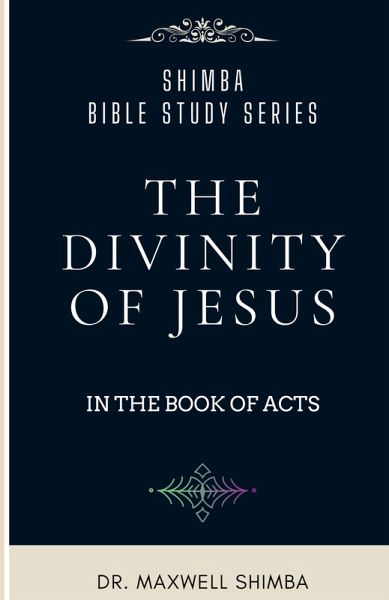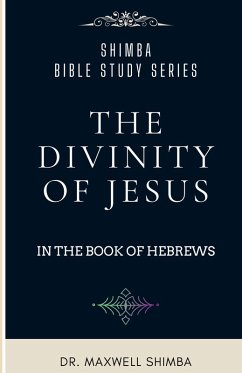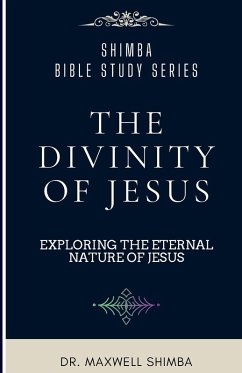
The Divinity of Jesus in the Book of Acts
Versandkostenfrei!
Versandfertig in 1-2 Wochen
22,99 €
inkl. MwSt.

PAYBACK Punkte
11 °P sammeln!
The Divinity of Jesus in the Book of Acts When readers engage with The Divinity of Jesus in the Book of Acts by Dr. Maxwell Shimba, they can expect a comprehensive and detailed exploration of the central themes that reveal Jesus' divine nature as portrayed throughout the Acts of the Apostles. Dr. Shimba's work is built on thorough theological research, with a strong emphasis on expository study and deep scriptural analysis. The book unpacks key passages that affirm Jesus as both the Son of God and the exalted Lord, drawing readers into a deeper understanding of early Christian beliefs and how ...
The Divinity of Jesus in the Book of Acts When readers engage with The Divinity of Jesus in the Book of Acts by Dr. Maxwell Shimba, they can expect a comprehensive and detailed exploration of the central themes that reveal Jesus' divine nature as portrayed throughout the Acts of the Apostles. Dr. Shimba's work is built on thorough theological research, with a strong emphasis on expository study and deep scriptural analysis. The book unpacks key passages that affirm Jesus as both the Son of God and the exalted Lord, drawing readers into a deeper understanding of early Christian beliefs and how the apostles bore witness to Jesus' divinity through their actions and teachings. The book emphasizes how the early church recognized Jesus not only as the Messiah but as the Son of God, holding equal status with God the Father. Readers will encounter key biblical references like Acts 9:20, where Paul immediately preaches that Jesus is the Son of God, affirming his divine origin. Dr. Shimba carefully examines the theological implications of this claim and how it laid the foundation for the early Christian understanding of Jesus' nature and mission. This exploration helps readers grasp the doctrinal significance of Jesus being proclaimed as God's Son and how it affected the spread of the Gospel. One of the main highlights of this work is Dr. Shimba's careful attention to how Acts presents Jesus as both the Son of David and the fulfillment of Jewish messianic expectations. By analyzing Peter's sermon on the day of Pentecost (Acts 2:29-30), where he refers to Jesus as the promised descendant of David, the book bridges the Old Testament prophecies with New Testament fulfillment. This connection is vital for readers seeking to understand how the early church viewed Jesus in light of Israel's long-awaited Messiah and how this lineage was integral to his divine identity. In addition to exploring Jesus' messianic role, the book delves into the significance of his exaltation as Lord. Readers can expect to see a detailed examination of the use of the term "kyrios" (Lord) for both God and Jesus in the book of Acts. Dr. Shimba offers a nuanced analysis of passages such as Acts 2:36, which states, "God has made this Jesus, whom you crucified, both Lord and Christ." Through this title, Jesus is shown not only as a human figure but as one who shares in the divine authority of God, a point Dr. Shimba emphasizes through careful linguistic and theological study. Another key expectation for readers is the exploration of Jesus' divine functions in Acts, such as his role in pouring out the Holy Spirit (Acts 2:33) and granting repentance and forgiveness (Acts 5:31). The book shows that these are not merely the actions of a prophet or teacher, but of a divine being who operates with the authority of God himself. Dr. Shimba provides insightful commentary on how the apostles recognized Jesus' unique role in the divine economy, portraying him as the one through whom God's saving work is accomplished. Readers will also encounter a thorough discussion of how Jesus is portrayed as the judge of the living and the dead, based on Acts 10:42. Dr. Shimba explains the significance of this title, which reinforces Jesus' ultimate authority over all humanity and the final judgment. This aspect of Jesus' divinity is crucial to understanding his comprehensive role in God's redemptive plan, which encompasses not only salvation but also divine justice. This book helps readers to reflect on how Jesus' role as judge connects to his broader identity as the eternal Son of God. Finally, The Divinity of Jesus in the Book of Acts brings out the practical and devotional implications of these theological insights. Dr. Shimba encourages readers to see how the divine identity of Jesus, as revealed in Acts, continues to have a profound impact on Christian life and faith today.














